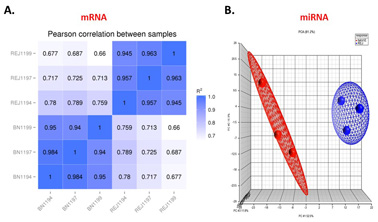Mechanistic Insights by RNA Profiling on Rejecting Vascularized Composite Allotransplants.
1Center for Vascularized Composite Allotransplantation, Chang Gung Memorial Hospital at Linkou, Taoyuan, Taiwan
2College of Medicine, Chang Gung University, Taoyuan, Taiwan
3Department of Plastic and Reconstructive Surgery, Chang Gung Memorial Hospital at Linkou, Taoyuan, Taiwan
Meeting: 2017 American Transplant Congress
Abstract number: D42
Keywords: Gene expression, Rejection
Session Information
Session Name: Poster Session D: Diagnostics/Biomarkers Session II
Session Type: Poster Session
Date: Tuesday, May 2, 2017
Session Time: 6:00pm-7:00pm
 Presentation Time: 6:00pm-7:00pm
Presentation Time: 6:00pm-7:00pm
Location: Hall D1
Background: Detailed molecular changes associated with rejection to vascularized composite allotransplants (VCA) are not well understood. Materials and Methods: peripheral blood was drawn from the rat VCA (from BN to LEW) recipients before transplantation and during rejection. The VCA skins were collected in the same paired fashion as well. RNA of these four sample groups was extracted. RNA from the skins was subjected to next generation sequencing (NGS), targeting messenger RNA (mRNA) and microRNA (miR) simultaneously. Data were validated with quantitative RT-PCR on the original and a separate sample sets. Results and Discussion: overall, 19580 mRNA and 597 miRNA species were identified. Pearson's correlation test and principal component analysis showed good data separation between naïve and rejection groups (figure). With probability threshold set at 0.01, 1257 and 446 mRNAs were identified to be up- and down-regulated, respectively, at the rejection group. For miRs, 25 were up-regulated, whereas 19 were down-regulated in rejection samples. Validation with quantitative RT-PCR on 20 genes showed good data agreement. Preliminary bioinformatic analysis showed that the major pathways to be activated during rejection include cytotoxicity, chemokine signaling, as well as the antigen processing and presentation. Ongoing efforts include studying the relationship between miRNA and mRNA expression, and characterizing the significance of the specific pathways. Roles of these genes on induction of tolerance to VCA will also be investigated. It is expected that the roles of specific gene and miR expression in the process of rejection to VCA will thus be better delineated.
CITATION INFORMATION: Cheng H.-Y, Liu S.-C, Lin C.-F, Shih L.-Y, Wei F.-C. Mechanistic Insights by RNA Profiling on Rejecting Vascularized Composite Allotransplants. Am J Transplant. 2017;17 (suppl 3).
To cite this abstract in AMA style:
Cheng H-Y, Liu S-C, Lin C-F, Shih L-Y, Wei F-C. Mechanistic Insights by RNA Profiling on Rejecting Vascularized Composite Allotransplants. [abstract]. Am J Transplant. 2017; 17 (suppl 3). https://atcmeetingabstracts.com/abstract/mechanistic-insights-by-rna-profiling-on-rejecting-vascularized-composite-allotransplants/. Accessed February 19, 2026.« Back to 2017 American Transplant Congress
